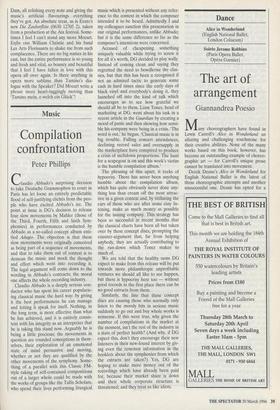Music
Compilation confrontation
Peter Phillips
Claudio Abbado's surprising decision to take Deutsche Grammophon to court in Paris has let loose an entirely predictable flood of self-justifying clichés from the peo- ple who have excited Abbado's ire. The point at issue is DG's decision to release four slow movements by Mahler (those of the Third, Fourth, Fifth and Sixth Sym- phonies) in performances conducted by Abbado as a so-called concept album enti- tled Adagio. The objection is that these slow movements were originally conceived as being part of a sequence of movements, and that to take them out of context is to demean the music and mock the thought and effort which went into recording it. The legal argument will come down to the wording in Abbado's contracts; the moral one affects the whole recording industry.
Claudio Abbado is a deeply serious con- ductor who has spent his career popularis- ing classical music the hard way: by giving it the best performances he can manage and letting it speak for itself. Nothing, in the long term, is more effective than what he has achieved, and it is entirely consis- tent with his integrity as an interpreter that he is taking this stand now. Arguably he is being a little precious; the movements in question are rounded conceptions in them- selves, their exploration of an emotional state of mind persuasive and moving, whether or not they are qualified by the other movements of the symphony. Some- thing of a parallel with this Classic FM- style taking of self-contained compositions out of a larger whole could be made with the works of groups like the Tallis Scholars, who spend their lives performing liturgical music which is presented without any 'refer- ence to the context in which the composer intended it to be heard. Admittedly I and my colleagues sanction this presentation in our original performances, unlike Abbado; but it is the same difference so far as the composer's intentions were concerned.
Accused of cheapening something uniquely valuable while trying to screw it for all it's worth, DG decided to play wally. Instead of coming clean and saying they regretted the need to bowdlerise the clas- sics, but that this has been a recognised if not an admired tactic to generate some cash in hard times since the early days of black vinyl and everybody's doing it, they launched off into the kind of talk which encourages us to see how grateful we should all be to them. Liam Toner, head of marketing at DG, went about his task in a recent article in the Guardian by creating a mood of panic and then showing how sensi- ble his company were being in a crisis. 'The word is out,' he began. 'Classical music is in big trouble. Falling concert attendances, declining record sales and oversupply in the marketplace have conspired to produce a crisis of meltdown proportions. The hunt for a scapegoat is on and this week's victim is the humble compilation album.'
The phrasing of this apart, it reeks of hypocrisy. There has never been anything humble about the compilation album, which has quite obviously never done any- thing less than cream off the most attrac- tive in a given context and, by titillating the ears of those who are after some easy lis- tening, make as much money as possible for the issuing company. This strategy has been so successful in recent months that the classical charts have been all but taken over by these concept discs, prompting the counter-argument that, far from helping anybody, they are actually contributing to the run-down which Toner makes so much of.
We are told that the healthy sums DG expect to make from this release will be put towards more philanthropic unprofitable ventures we should all like to see happen, but there is hypocrisy here too — without good records in the first place there can be no good extracts from them.
Similarly, the line that these concept discs are causing those who normally only listen to the moody bits in serious music suddenly to go out and buy whole works is nonsense. If this were true, why given the number of compilations in the market at the moment, isn't the rest of the industry in a state of perfect health? (And why, if DG expect this, don't they encourage their new listeners in their new-found interest by giv- ing even the remotest information in the booklets about the symphonies from which the extracts are taken?) Yes, DG are hoping to make more money out of the recordings which have already been paid for, because their market share is down and their whole corporate structure is threatened; and they treat us like idiots.


























































 Previous page
Previous page